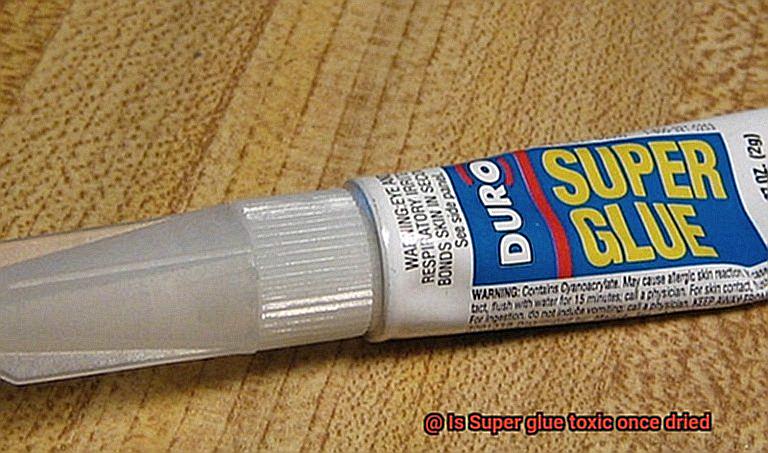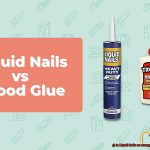Welcome back to our blog, where we’re all about uncovering the secrets of everyday products.
Today, we’ve got a question that’s been bugging us: Is super glue toxic once it’s dried? We’ve all experienced that heart-stopping moment when we accidentally get some on our fingers, but what about after it’s hardened into a rock-solid bond?
Could it still be lurking there, waiting to wreak havoc on our health? Well, fret no more.
We’re diving headfirst into the world of super glue to give you all the juicy details. From its sneaky chemical makeup to any potential health risks, this article is your one-stop-shop for understanding just how toxic dried super glue really is.
So grab your detective hat and let’s solve this sticky mystery once and for all.
What is Super Glue?
Contents
Super Glue, also known as cyanoacrylate adhesive, is a game-changing adhesive that packs a powerful punch. With lightning-fast bonding capabilities, this versatile adhesive forms unbreakable bonds between a variety of materials. From plastics to metals, wood to ceramics, Super Glue can conquer them all.
At the heart of Super Glue’s superpower lies its secret ingredient: cyanoacrylate. This chemical compound undergoes a magical transformation when it encounters moisture, rapidly polymerizing to create an impenetrable bond. In mere seconds, Super Glue can work its magic and securely fuse surfaces together.
But what sets Super Glue apart from other adhesives on the market? Its ability to bond porous materials and fill gaps is truly mind-boggling. While traditional adhesives require a snug fit between surfaces, Super Glue fearlessly dives into the tiniest of gaps and creates an unyielding bond by filling in those spaces. Delicate ceramics or broken parts can be resurrected with the help of Super Glue’s precision.
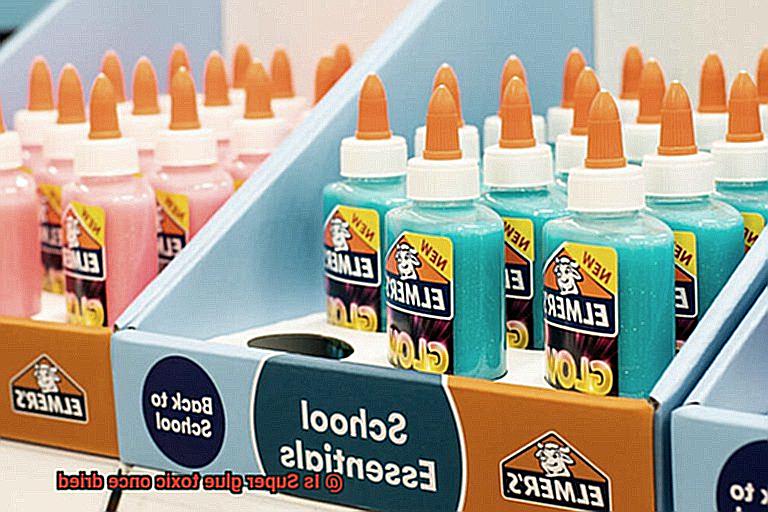
However, Super Glue’s talents don’t stop at bonding alone. It moonlights as a sealant extraordinaire, expertly preventing leaks and securing connections in various applications. And believe it or not, it even moonlights as a temporary fix for minor cuts and wounds. Acting as a liquid bandage, Super Glue can provide immediate relief until proper medical attention can be sought. But remember, deep cuts and serious wounds require professional care – Super Glue should stick to its day job.
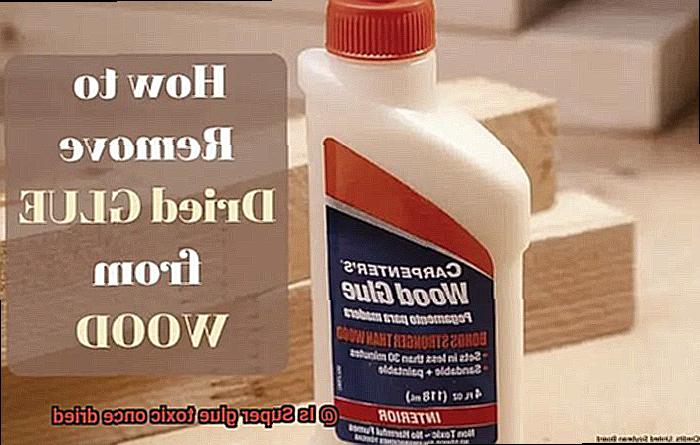
With different viscosities available, Super Glue offers options for every situation. Thin viscosity varieties excel at bonding smooth surfaces that fit together flawlessly. On the other hand, thicker variations are masters at bonding uneven or rough surfaces with ease.
How Does Super Glue Work?
Super Glue, also known as cyanoacrylate adhesive, is a remarkable adhesive that works its magic through a process called polymerization. When this adhesive comes into contact with moisture, it sets off a chemical reaction that leads to the formation of a strong and durable bond.
Let’s dive deeper into how this process works. Super Glue contains a liquid monomer called cyanoacrylate, which consists of carbon, hydrogen, and nitrogen atoms arranged in a way that makes it highly reactive. When the cyanoacrylate comes into contact with moisture, such as water vapor in the air or on the surfaces being bonded, an amazing transformation begins.
This moisture triggers anionic polymerization, wherein the cyanoacrylate monomer molecules react with each other. As a result, strong covalent bonds form between the carbon atoms, creating a solid polymer network. This rapid polymerization process is what allows Super Glue to dry within seconds and create an incredibly strong bond.
Super Glue’s ability to bond different materials like wood, metal, plastic, and even skin is due to its reliance on moisture. The presence of moisture on these surfaces initiates the polymerization process and enables the adhesive to form a tight and secure bond.
However, there are certain materials like glass or ceramics that lack moisture and may pose a challenge for Super Glue. In such cases, adding a small amount of water or using specialized primers designed for non-porous surfaces can help enhance the bonding strength.
Is Super Glue Toxic When Dried?
The toxicity of super glue when dried depends on several factors, including brand, formulation, and usage. While the cured adhesive itself is generally considered safe for external use, there are some important considerations to keep in mind.
The primary concern regarding the toxicity of super glue lies in its fumes rather than the cured adhesive itself. When super glue is applied and starts to dry, it releases fumes that can be irritating to the eyes, nose, and throat. These fumes can cause symptoms such as coughing, sneezing, watery eyes, and difficulty breathing. Prolonged exposure to the fumes may lead to more severe respiratory issues.
The toxicity of super glue fumes depends on the specific brand and formulation of the adhesive. Some brands may have lower levels of volatile organic compounds (VOCs) in their formulas, resulting in less toxic fumes when dried. It is important to consider this when selecting a brand or formulation for your projects.
To minimize the risk of inhaling toxic fumes from super glue, it is essential to use it in a well-ventilated area. Opening windows or using fans can help dissipate the fumes and reduce their concentration in the air. Working in a confined space without proper ventilation can increase the potential risks.
Wearing protective equipment such as gloves and goggles is advisable when working with super glue to prevent direct contact with the adhesive or accidental transfer to sensitive areas like the eyes. This can help minimize the risk of skin irritation or eye damage.
Once super glue has dried and formed a bond, it is generally considered safe for external use. The cured adhesive is not known to leach harmful chemicals into the skin or bloodstream. However, if there is accidental contact with super glue before it dries and forms a bond, it may adhere to the skin and cause irritation. Soaking the affected area in warm soapy water can help loosen the adhesive and facilitate its removal.
It is important to note that super glue should never be ingested or used on open wounds. Ingesting super glue can cause gastrointestinal issues, and applying it to open wounds may impede proper healing and increase the risk of infection.
Potential Risks of Using Super Glue
Using super glue may seem convenient for a variety of tasks, but it is crucial to understand the potential risks associated with its use. Here are some potential risks to consider:
- Skin irritation or burns: Super glue has the potential to cause chemical burns when it comes into contact with the skin. Whether applied directly or accidentally spilled, this adhesive can inflict a burning sensation that ranges from uncomfortable to downright painful. Redness, swelling, and blisters may also occur.
- Eye injury: The eyes are particularly vulnerable to the dangers of super glue. If it enters the eyes, severe irritation and damage can result. The adhesive can bond to the eye’s surface, leading to blurred vision, redness, and considerable discomfort. Removing the glue may require professional medical assistance.
- Inhalation of fumes: When super glue is used, it releases small amounts of cyanoacrylate vapor. Inhaling this vapor can irritate the respiratory system, manifesting as coughing, difficulty breathing, and throat irritation. To mitigate exposure to these fumes, always work in a well-ventilated area.
- Ingestion: Swallowing super glue can have serious health consequences such as gastrointestinal blockage or poisoning. Consequently, it is imperative to keep super glue out of reach of children and pets to prevent accidental ingestion.
- Allergic reactions: Some individuals may develop an allergic reaction to cyanoacrylate adhesive, resulting in symptoms like skin rash, itching, or hives. Those with a history of allergies should exercise caution when using super glue and consider alternative adhesives.
- Accidental bonding: Due to its rapid-drying nature, it is incredibly easy to accidentally bond fingers or other body parts together while applying super glue. This can lead to pain and potential injury during the separation process.
To minimize these risks, follow these crucial tips:
- Wear protective gloves to avoid direct contact with the skin and eyes.
- Work in a well-ventilated area to reduce inhalation of fumes.
- Store super glue out of reach of children and pets.
- If accidental bonding occurs, soak the affected area in warm soapy water and gently pry the bonded skin apart rather than forcefully pulling it.
Precautions When Working With Super Glue
Super glue, also known as cyanoacrylate adhesive, possesses remarkable bonding properties that can secure objects swiftly and securely. However, it is crucial to exercise caution and adhere to certain precautions when working with super glue to ensure personal safety and avoid potential health risks.
First and foremost, protecting your skin is paramount when handling super glue. This adhesive has the ability to bond skin together almost instantly, causing irritation and potential injury. To safeguard your skin, it is highly recommended to wear gloves or apply a barrier cream before coming into contact with super glue.
In addition, working in a well-ventilated area is essential when using super glue. The fumes emitted from this adhesive can be irritating to the respiratory system, particularly if inhaled in large quantities or for prolonged periods. Enhancing air circulation by opening windows or utilizing fans can effectively reduce exposure to these fumes.
Another critical precautionary measure is to safeguard your eyes. Accidental splashes or contact of super glue with the eyes can result in severe irritation and damage. Therefore, it is strongly advised to wear safety goggles or glasses while working with this adhesive.
It is imperative to keep super glue out of the reach of children and pets due to its potential toxicity if ingested. Storing the adhesive in a secure location and properly disposing of any unused or empty containers are vital steps to prevent harm to their health.
When opening a new tube or bottle of super glue, it is essential to handle it with care. Some brands may have a built-in puncture tool or nozzle that must be activated before use. Adhering closely to the manufacturer’s instructions will help avoid accidental spills or leaks.
In case of accidental skin contact with super glue, it is crucial not to attempt forcefully pulling apart the bonded areas. Instead, gently soak the affected area in warm soapy water or use an acetone-based nail polish remover to dissolve the adhesive. Seeking medical assistance may be necessary if the situation persists.
Lastly, proper storage of super glue is critical for maintaining its effectiveness and preventing accidents. Store the adhesive in a cool, dry place, away from direct sunlight and extreme temperatures. Ensuring that the container is tightly sealed will prevent any leaks or spills.
How to Remove Super Glue From Skin
Super glue is a powerful adhesive that can be difficult to remove once it gets on your skin. However, with the right methods and a little patience, you can safely and effectively remove super glue from your skin. Here are five steps you can follow:
Acetone or Nail Polish Remover:
One of the most common methods to remove super glue from the skin is by using acetone, which is found in nail polish remover. Acetone is a strong solvent that can break down the super glue and make it easier to remove. To use this method, apply a small amount of acetone to a cotton ball or cloth. Gently rub the affected area with the acetone-soaked cotton ball, keeping in mind that you should use it sparingly. Rub until the super glue starts to loosen and come off. After removing the super glue, wash the area thoroughly with soap and water to remove any residue.
Warm Soapy Water:
Another effective method for removing super glue from the skin is to soak the affected area in warm soapy water. This can help loosen the super glue and make it easier to peel off. Fill a basin or bowl with warm water and add a few drops of mild soap. Soak the affected area in the warm soapy water for 10-15 minutes. Gently try to peel off the super glue while it is still wet and softened. If the glue doesn’t come off easily, continue soaking until it loosens enough to be peeled off.
Rubbing Alcohol or Hand Sanitizer:
Rubbing alcohol and hand sanitizer can also be used to dissolve super glue and remove it from the skin. These products contain ingredients that can break down the glue and help it to loosen. Apply a small amount of rubbing alcohol or hand sanitizer to a cotton ball or cloth, then gently rub the super glue with the alcohol-soaked cotton ball. Keep rubbing until the glue starts to come off. After removing the super glue, wash the area with soap and water to remove any residue.
Commercial Adhesive Removers:
If other methods don’t work, you can try using a commercial adhesive remover specifically designed for removing super glue from the skin. These products are available at drugstores or online and can be applied directly to the affected area. Follow the instructions on the product carefully. Apply the adhesive remover to the affected area and let it sit for a few minutes. Gently rub or peel off the super glue. Wash the area with soap and water to remove any residue.
Moisturize the Skin:
After removing the super glue, it’s important to moisturize the skin to restore its moisture balance. Super glue and some of the removal methods can be drying to the skin, so applying a gentle moisturizer or lotion to the affected area is recommended. Massage the moisturizer into the skin until it is fully absorbed.
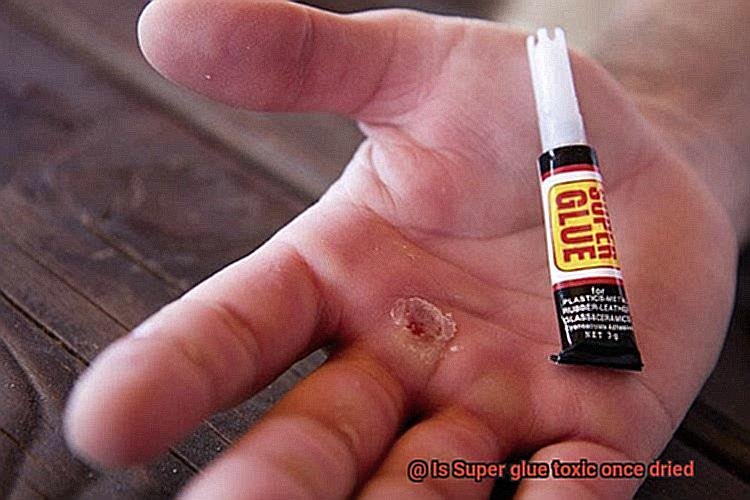
Remember, if you experience any irritation or discomfort during the removal process, stop and seek medical advice. It’s always better to be cautious when dealing with strong adhesives like super glue.
Different Types of Super Glues
Cyanoacrylate Adhesive:
Cyanoacrylate adhesive is the go-to super glue for many projects. Its bond is strong and fast, making it perfect for materials like metal, plastic, and wood. Need to repair a broken toy or fix a household item? Cyanoacrylate adhesive will get the job done in no time. Its powerful bond can withstand the stresses of everyday use, ensuring a durable and long-lasting repair.
Epoxy Adhesive:
Looking for a super glue with high strength and versatility? Look no further than epoxy adhesive. This type of super glue consists of two parts that need to be mixed together before use. Once mixed, it forms a bond that can withstand even the toughest conditions. From ceramics to glass to rubber, epoxy adhesive can bond a wide range of materials, making it a handy tool for various projects.
Specialized Super Glues:
Sometimes, you need a super glue specifically formulated for certain materials or situations. Take fabric or leather, for example. There are super glues designed specifically for mending clothes or accessories made from these materials. Additionally, there are super glues formulated for underwater applications, making them ideal for fixing leaks or cracks in aquariums or plumbing.
Toxicity Considerations:
While cyanoacrylate adhesive is generally safe once fully cured, it’s important to be aware that other types of super glues may contain potentially harmful chemicals if ingested or inhaled. Always follow the manufacturer’s instructions and take proper safety precautions when using any type of super glue to protect yourself and others around you.
Safety Precautions:
When working with super glue, it’s essential to create a safe environment. Make sure you work in a well-ventilated area to minimize exposure to fumes. Wearing gloves can protect your skin from accidental bonding, and always avoid contact with your eyes or mouth. If you have any concerns about the toxicity of a specific product, check the label or contact the manufacturer for information about its ingredients and potential health risks.
Choosing the Right Type:
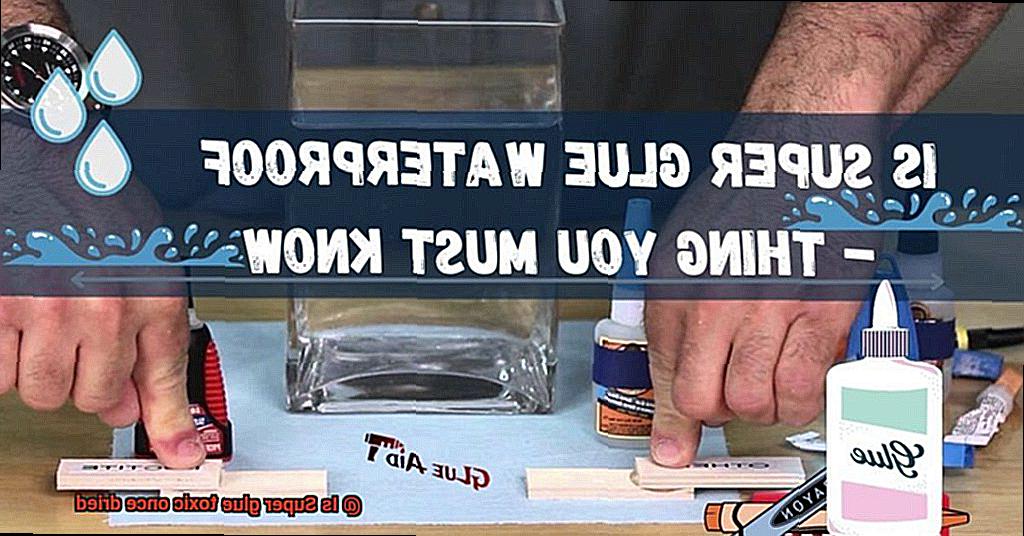
With so many types of super glues available, it’s crucial to choose the right one for your project. Consider the materials you need to bond and any special requirements, such as flexibility or high-temperature resistance. By selecting the appropriate super glue, you can ensure optimal bonding performance and durability for your specific needs.
Safety Guidelines for Using Super Glue
When it comes to using super glue, safety should always be your top priority. By following these guidelines, you can ensure a safe and successful experience:
- Read and Follow the Instructions: Every super glue product comes with specific instructions and safety guidelines. Take the time to read and understand them before starting your project. This will ensure that you use the adhesive correctly and avoid any potential risks.
- Avoid Direct Contact: Super glue can bond skin together almost instantly, causing irritation or injury. To prevent this, it is crucial to avoid direct contact with the adhesive. If you accidentally get super glue on your skin, do not pull or force the bonded areas apart. Instead, soak the affected area in warm soapy water and gently peel or roll the skin apart. Patience and care are essential in safely removing the adhesive from your skin.
- Wear Protective Gloves: To protect your skin from accidental contact with super glue, it is recommended to wear disposable latex or nitrile gloves when working with the adhesive. These gloves act as a barrier between your skin and the glue, minimizing the risk of contact and potential irritation.
- Ensure Adequate Ventilation: Super glue fumes can cause irritation to the eyes, nose, and throat. Therefore, it is important to work in a well-ventilated area or use a fan or open windows to ensure proper air circulation. This will help dissipate any fumes that may be released during the drying process, reducing the risk of respiratory discomfort.
- Keep Away from Heat Sources: Super glue is flammable and can release toxic fumes when exposed to high temperatures. Avoid using it near open flames or heat sources that could ignite the adhesive or create a hazardous environment.
- Store Properly: Store super glue in a cool, dry place and keep the lid tightly closed when not in use. Exposure to moisture can cause premature curing of the adhesive, making it less effective. By storing it correctly, you can extend the shelf life and maintain the adhesive’s quality.
- Keep out of Reach of Children and Pets: Accidental ingestion of super glue can lead to health complications. Store it in a secure location where children and pets cannot access it. This will prevent any potential accidents or harm caused by ingesting or playing with the adhesive.
- Eye Contact: In case of eye contact with super glue, flush the affected eye with clean water for at least 15 minutes and seek medical assistance immediately. Prompt action is crucial in minimizing any potential damage to the eye.
- Check Specific Instructions: Different brands of super glue may have variations in their composition and safety guidelines. Always consult the specific instructions provided by the manufacturer for the adhesive you are using. This will ensure that you are aware of any unique precautions or recommendations specific to that particular product.
- Seek Medical Attention if Needed: If you experience any adverse reactions or symptoms after using super glue, such as skin irritation, difficulty breathing, or allergic reactions, discontinue use and seek medical attention promptly. Your health and well-being should always take precedence, and a medical professional can provide proper guidance and treatment if necessary.

dRGugZZpScw” >
Conclusion
Super glue is a powerful adhesive that can bond almost anything together.
But what happens once it dries? Is it safe to handle?
The answer is yes, super glue is generally considered non-toxic once it has fully cured. Once the glue has dried completely, it forms a hard and durable bond that is resistant to water and heat.
This means that it won’t release any harmful fumes or toxins into the air. So you can rest assured that using super glue in your DIY projects or everyday repairs won’t pose any significant health risks.
However, it’s important to remember that while super glue itself may not be toxic, it should still be used with caution. Avoid contact with skin and eyes, as the glue can cause irritation and damage if not handled properly.
Always read and follow the instructions on the product label to ensure safe usage.

